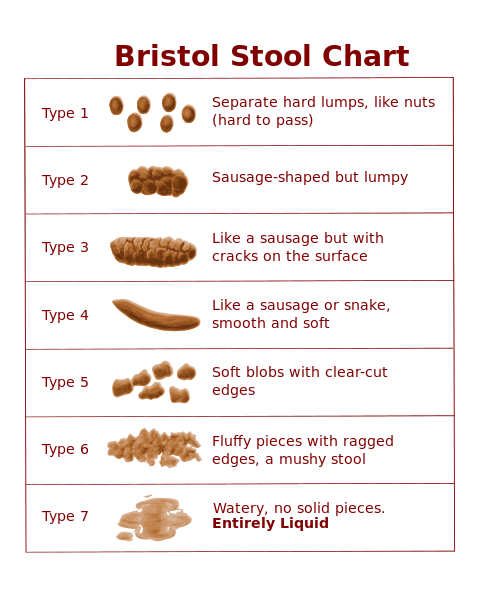Pooping 101: 4 Signs Your Poop Is Healthy


You wouldn’t believe some of the poop pictures people email us.
I’ll spare you the details, but I’ve seen more poop selfies from people to last a lifetime. Our team started putting disclaimers on these emails so we didn’t open them while eating ha ha.
But in all seriousness, I’m very happy these people are actually using their poop as a troubleshooting tool. Many people don’t (or won’t), because talking about poop can be very weird in today’s culture.
But if we’re honest about it we can learn a lot from our poop. If we actually stop and take a look in the toilet bowl, our poop can be a very real indication of our health on a regular basis.
Your Poop is Whispering to You
We all poop. It’s one of the few reminders we get about our health on a (hopefully) daily basis, and yet most don’t pay much attention to it. But the truth is: if you’re not pooping right, it could be a subtle clue from your body that something is going wrong.
You’re probably spending a lot of time and energy to consume healthy, real food. But are you digesting it well? Are you breaking it down and absorbing all of the nutrients? The quality of your poop is a direct indication of how well your digestive tract is functioning.
If you’re poop isn’t healthy, your digestive tract is either moving too slow or too fast… which can lead to an increased risk of conditions like neurological disease, autoimmune disease and chronic inflammatory conditions.
Not only that, recent research suggests that your brain and the good bacteria in your gut communicate directly with one another influencing your mood, immune system, and inflammation levels (1) (2) (3).
There’s also good short-chain fatty acids (SCFAs) in your colon, which have anti-inflammatory effects and increase insulin sensitivity (4).
Think of your poop like the check engine light in your car. We all hate it when that turns on, but it’s important. Your engine might need something simple like a new air filter… or it could be 2 miles before everything blows up. If you don’t do something about it, you could get stranded on the side of the road with a huge repair bill.
BUT… if you’re pooping well it could be a good sign your body is doing well and on the way to good health.
Is Your Poop Healthy?
There are four keys to a perfect poop. If you’ve ever had one… you know what we’re talking about. But if you’re not sure, take this poop assessment and see where you stack up.
1. Does your poop look like a snake?
The most important part of a healthy poop is the quality, so you need to start looking down and see what’s really going on in the toilet. Thankfully, the folks at the University of Bristol published a study in the Scandinavian Journal of Gastroenterology, gifting us with the Bristol Stool Chart (5).
Here it is:

Where does your most recent BM stack up? Anything between a Bristol 1-3 is considered constipated, while 6’s and 7’s are considered diarrhea.
What this means: A healthy poop is “like a sausage or a snake, smooth and soft.” If your poops aren’t looking 4-ish, it could be trying to tell you something (like you have low stomach acid).
2. How often are you pooping?
Everyone is different, but the research agrees we should all poop every day. The range of healthy is typically 1-3 times a day, and it can vary day-to-day. Poop is waste and you need to get rid of it every day to make sure that you’re properly removing toxins. Some people even have bowel movements every time they eat.
What this means: If you find yourself pooping a couple times a week, you’re probably constipated. If you’re going 5+ times a day, you’re on the diarrhea side of things. Both could pose serious health risks over the long term.
3. How easy is it to poop?
It’s so normal in our culture to take a newspaper to the bathroom and spend 30 minutes in there battling it out with your poop. But the reality is a healthy poop should only take but a few minutes. It should be easy. Pushing typically leads to hemorrhoids, which are all too common today.
What this means: Normal poop strikes a balance between not having to push or strain, but also not having so much urgency you can barely hold it. If you’re spending 10+ minutes on the toilet or running to make it just in time, you’re not having healthy bowel movements.
4. Did you get it all out?
For some people this is a non-issue… but part of a healthy poop is having what’s called “full evacuation.” Are you getting all your poop out when you sit down? Do you have to keep coming back over and over again? Or do you feel like there’s always something left behind making you feel uncomfortable?
What this means: A healthy poop is a complete one. If you never quite feel empty, then you’re not having healthy bowel movements.
3 Tips to Improve Your Poop
If your poop isn’t normal based on the quiz above, we know your digestive health isn’t what it should be. So, here’s a few tips to improve your digestive health and get closer to perfect poops.
1. Avoid the 4 Horsemen
The biggest problem we see with people eating a real food diet, like Paleo, SCD, WAPF, or GAPS, is when they’re still not pooping well. There could be a lot of different root causes behind that, but the first place to start troubleshooting is the “4 horsemen.” These are the 4 most common foods that are allowed, but cause a lot of problems. They are dairy, nuts/nut flours, eggs, and too much fruit/honey.
If you’re someone who’s struggling with constipation or diarrhea, you need to start troubleshooting your diet first. The most important thing you can do is listen to what your poop is telling you and continue to make changes and improve the food you’re eating. Removing the four horsemen can sometimes transform people’s poop overnight.
2. Eat Good Bugs
Our gut has a TON of bacteria, and a healthy gut flora is critical for healthy poop.
Consume good bugs every single day. Start with foods like sauerkraut, kimchi or water kefir and see how well you tolerate them. A high quality probiotic, like Prescript Assist, is one supplement that can also boost the immune system in the gut and improve digestive health. To learn more about probiotics, go here.
3. Eat More Fat (And Take Digestive Enzymes)
Fat has a direct impact on peristalsis… the waves our bodies make to get rid of poop. Fat can be extremely helpful for people who are constipated. Increase your healthy fats from sources like coconut oil, animal fat, olive oil, and fermented cod liver oil.
However, increasing healthy fats can sometimes make diarrhea worse, which is why we recommend starting out with a good digestive enzyme (brands in this video). They contain Lipase, which is the enzyme that can help digest healthy fats.
If you aren’t having healthy poops right now, try these three changes for 30 days and see how you feel. The best part about poop is that it keeps giving you feedback, so you have regular signs of whether these changes are helping or not.
If you’ve tried all of this but you’re still in need of next level support, then register for our webinar on how to tune into your body to understand what it needs to work better:
Stop Ignoring Your Body: How Subtle Clues are Telling You Exactly What to Do Next…
Here are just a few things we’ll show you on the webinar:
- How to decode your poop to know exactly what’s broken
- Why cramping is a dead giveaway and the specific steps you need to follow for relief
- If gas is normal and what it means if you’re not healing
- How to quickly come up with THE RIGHT TWEAK to stop nagging symptoms fast, through our “hot seat” tweaking sessions
- How to understand the subtle clues from your body so deeply that your next steps will become obvious
We even share a quick at-home test you can try immediately if you’re having stomach pain and our bonus 5-day emergency diet handout detailing the exact foods we eat to relieve symptoms in 5 days (this is something we’ve been testing for years).
Hope to see you there!
– Jordan
P.S. – Where does your poop stack up? Leave a comment and let us know.
Did You Like this Article?
Subscribe to our newsletter to receive email notifications, some ways to find relief, and next steps.
